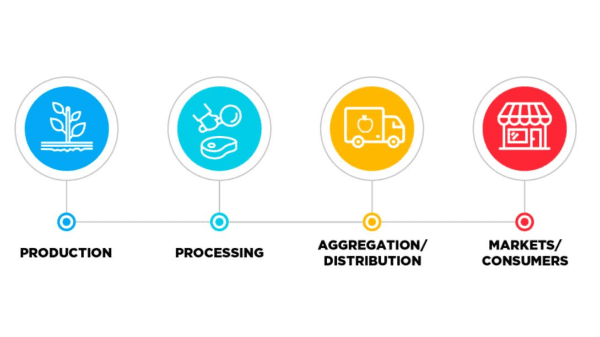June 1, 2022 Washington, D.C. and Newark, DE. – International Fresh Produce Association (IFPA) BB #:378962 has responded to the U.S. Department of Agriculture’s (USDA) announced “Food System Transformation Framework” highlighting the aspects most likely to impact fresh produce and floral.
“We applaud the USDA on their ambitious approach shared in the ‘Food System Transformation Framework’ to achieve a more fair, competitive and resilient food system,” said IFPA’s Chief Public Policy Officer Robert Guenther.
“We have seen a variety of global disruptions expose many weaknesses in our U.S. and global food system. We look forward to the rollout of the plan that will focus on creating a more sustainable and resilient system that recognizes the importance for farmers to remain profitable while also expanding access to nutritious food for all.”
IFPA’s Government Relations and Food Safety experts reviewed the framework and have highlighted the following key aspects of the plan that are most likely to impact the fresh produce and floral supply chain:
PRODUCTION & PROCESSING
• $200 million for Food Safety Certification for Specialty Crops Program for specialty crop operations that incur eligible on-farm food safety program expenses to offset compliance costs of regulatory requirements and market-driven food safety certification requirements.
• Up to $600 million in financial assistance to support food supply chain infrastructure aimed at independently owned and available infrastructure such as cold storage, refrigerated trucks, and processing facilities are in short supply but essential to creating a more resilient food system.
• Up to $300 million in a new Organic Transition Initiative to provide comprehensive support for farmers to transition to organic production through technical assistance, including farmer-to-farmer mentoring; provide direct support through conservation financial assistance and additional crop insurance assistance and support market development projects in targeted markets.
• Up to $75 million to support urban agriculture. The 2018 Farm Bill authorized the Office of Urban Agriculture and Innovative Production to award competitive grants to support urban agriculture.
• $400 million to create regional food business centers that will provide coordination, technical assistance, and capacity building support to small and mid-size food and farm businesses, particularly focused on processing, distribution and aggregation, and market access challenges.
NUTRITION & FOOD SUPPLY
• Additional $40 million in the GusNIP Produce Prescriptions Program. This program funds projects that demonstrate and evaluate the impacts of fresh produce prescriptions to increase fresh fruit and vegetable consumption, improve health, and reduce food insecurity.
• $100 million to create a new Healthy Food Incentive Fund, which will support school food authorities to innovate and accelerate their efforts to improve the nutritional quality of school meals to children.
• $60 million to leverage increased commodity purchases through Farm-to-School. Farm-to-school programs are a proven model of increasing markets for farmers via child nutrition programs while also providing children healthy, fresh food.
• Increases Healthy Food Financing Initiative to $155 million. Aimed at ‘food deserts’, this program provides grants and loans to entities that offer healthy food in communities that are underserved by grocery stores and other food retailers.
• $25 million to support SNAP technology improvements to modernize the delivery of incentive programs through SNAP’s electronic benefit transfer (EBT) technology.
• Up to $90 million to prevent and reduce food loss and waste. Wasted food results in unnecessary uses of energy as well as methane and CO2 emissions; reducing food waste can help the United States meet its climate commitments.
IFPA was present at Georgetown University for the USDA’s announcement on June 1 and will continue to monitor the rollout of the Food System Transformation Framework. The association will focus on maximizing opportunities for members and the produce and floral communities.
More information on IFPA’s priority issues can be found here.
About the International Fresh Produce Association (IFPA)
The International Fresh Produce Association (IFPA)?is the largest and most diverse international association serving the entire fresh produce and floral supply chain and the only to seamlessly integrate world-facing advocacy and industry-facing support. We exist to bring the industry together to create a vibrant future for all. We grow our member’s prosperity by conducting advocacy; connecting people and ideas; and offering guidance that allows us all to?take action?with purpose and confidence.? While IFPA is built on the legacy of United Fresh and Produce Marketing Association, it is not just a combination. It is transformational. Recognizing the industry required an even more powerful and unified voice, the leaders of the former United Fresh and Produce Marketing Association chose not to merge, but rather to create an entirely new organization to supersede their organizations, effective January 1, 2022.
Contact: Siobhan May, SMay@freshproduce.com +1 (302) 781-5855



